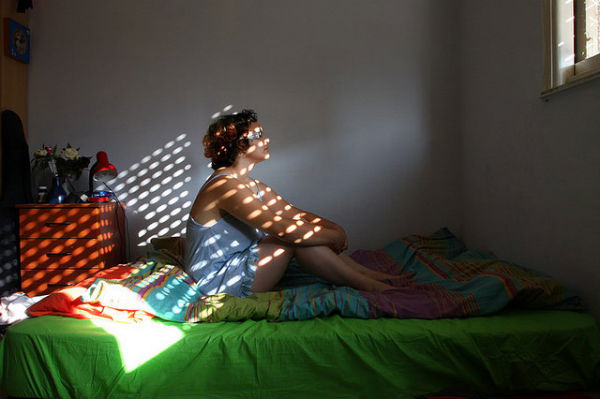To see a woman – she’s only just become a woman, 20 years old with a quote by John Muir posted on her wall. Outside it’s snowing, snowing because it’s Sweden, and she’s there studying the language of her forefathers. To hear a woman say: “Kram”.
To see a woman returning home and then traveling once more across the ocean to pursue a possible love story. To see a woman doubting the religion with which she grew up, struggling with her faith and finally braving the secular world, defying all fears. To see a woman choosing a field of expertiese, investing and toiling, then kicking off a career. To see a woman in a wedding gown, holding blue and yellow flowers.
To see a woman forming a picture of her world that leaves no room for lack of compassion or tolerance, that leaves no room for lack of wisdom, that leaves all the room for the world itself. To see a woman reading “The New Yorker”.
To see a woman immigrate to a hard country, a country in a constant state of tension and injustice. To see her struggle. To see her being misunderstood. To see her lonely. To see a woman lose love, to see her struggle to defy this fate. to see her wrathful. To see her divorcing. To see her start again on her native continent, redefining herself. To see her nurturing her soul and body. To see her find love again and fulfill new wishes. To see a woman at her brightest.
March 8th isn’t only international women’s day. It is also the birthday of someone who has been very dear to me and will always be. I stand in awe before who she is. Sometimes that’s all we as men can do: look you and try to learn what life is.
We see women go through life with an intensity we never will know, struggling with difficulties we can’t truly fathom: bodily, social and political, confronting emotion we will never acknowledge, facing risks and violence we find unimaginable, giving birth and playing the most intense roles in the lives of others, loving and loathing as women. Living, in short, on a totally different energy field. Though we understand little. We can still derive inspiration, and we do so even if we don’t tell you so.
George Eliot once said: “The happiest women, like the happiest nations, have no history.” The wisest men, like the wisest nations, know women’s history, both a specific woman’s history and the history of womenkind, and learn from it the most important lessons, including how stupid we have been.
Our history with women is much like a failed relationship, out of which women emerged hurt but triumphant. I’ll conclude this post with a song written long ago for the aforementioned lady, with a word of thanks to young Israeli artist Hadas Reshef, who’s responsible for the illustration and with a happy women’s day wish to any one who was ever called “she”.
.
[youtube]http://www.youtube.com/watch?v=8MWy0FC-eqM[/youtube]


